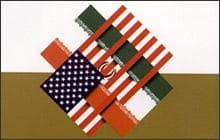Advertisement
The Future of US-Iran Relations
Resume
In the heart of Baghdad's Green Zone, US and Iranian diplomats posed for the cameras yesterday. It was the biggest break in nearly three decades in the deep freeze between Washington and Tehran. But what it means is still anybody's guess.
This month, US warships were war-gaming off the coast of Iran. Tehran was arresting Iranian-Americans on espionage charges. Tehran's nuclear program was reported blazing full-steam ahead. Dick Cheney was standing on an aircraft carrier in the Persian Gulf, talking tough.
This hour On Point: the US, now face-to-face with the Mideast's rising power — Iran.
Quotes from the Show:
"Well, it's an important beginning. After all, the two countries have not had formal public talks for almost three decades. It's at a particularly important juncture for the United States given its dire situation in Iraq but it also comes at an interesting time for Iran because it's facing a growing international pressure over its nuclear program. And if there's any sense, even though these talks are focused only on Iraq, that you can do business between the two that then opens the potential anyway for more of a dialogue, more progress on other issues down the road." Robin Wright
"[These talks are] in a sense a recognition of the American difficulty in Iraq. If Iraq was stable and stabilizing, then it's hard to see why United States would reach out to Iran and ask for its assistance. Now whether that assistance will be coming forth, it remains to be seen. I think to some extent that the objectives of the two countries ... are congruent." Ray Takeyh
"I don't think you can describe the Islamic Republic as a regime that values soft power and has a strong preference for negotiations. ... We should have been much tougher on Iran earlier on the issue of terrorism... The notion that Iran is going to help the US in Iraq is pretty far-fetched, I think." Reuel Marc Gerecht
"I'm not sure the series of coercive measures at our disposal might have an impact on Iran's national security policy." Ray Takeyh
"A lot of people look at the military dimension of this negatively. ... Iran could continue to misbehave ... but so far we see a tack in the right direction..." Steve Clemons
Guests:
Robin Wright, diplomatic correspondent for The Washington Post;
Ray Takeyh, senior fellow for Middle East Studies at the Council on Foreign Relations and author of "Hidden Iran: Paradox and Power in the Islamic Republic"
Reuel Marc Gerecht, resident fellow at the American Enterprise Institute and author of "The Islamic Paradox: Shiite Clerics, Sunni Fundamentalists, and the Coming of Arab Democracy"
Steve Clemons, director of the American Strategy Program at the New America Foundation
This program aired on May 29, 2007.